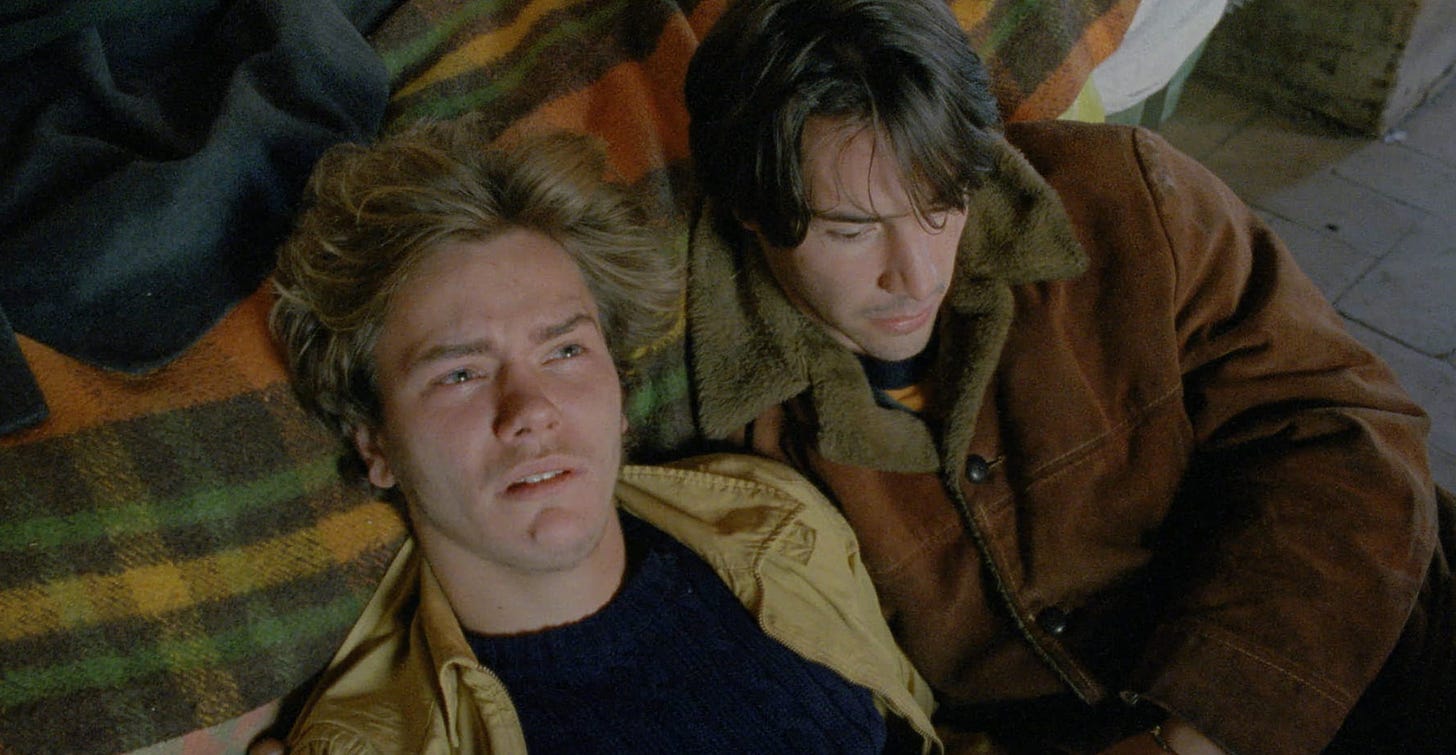Carbon dating myself with synth-pop
The enduring, the forgotten, and the 'Frozen' found within a 2014 Spotify playlist

Songs whisk you into the past pretty easily. It’s why every movie set in the 1960s puts Buffalo Springfield’s “For What It’s Worth” on the soundtrack, why Lil Jon is a lock at millennial wedding receptions, and why an elevator music melody turns A.I. junk into ’80s yuppie dreams on TikTok.
We all have our sonic triggers. If I listen to “The Great Escape” by Boys Like Girls, I’m instantly 18 years old and driving around South Austin at 3 a.m. with my friends. We’re all wearing skinny jeans and chugging Arizona green teas from the Walgreen’s at Brodie and William Cannon. I’ve never been happier.
This isn’t a revolutionary thought, but sometimes I wonder at what point your nostalgia reflex activates. When does a time in your life shift from “recently” to “back then”? How soon is too soon to check yourself into the musical retirement home? Scrolling through my playlists on Spotify, I came across a time capsule titled “My Top 100 Songs.” Spotify, among its crimes, no longer tells you when a playlist was created. Advanced carbon dating (I clicked on some of the songs and looked at the release dates) tells me it’s likely a list of the 100 songs I listened to most in 2014.
As I listened to this playlist, I felt a distinct sense of “then” swimming in my rib cage. If you’d like to slice open my 25-year-old self like a frog in biology class, here’s what I discovered.
Queue up your own decade-old playlist at your peril.
The ghosts of hyperfixation past
I’m pleased that the No. 1 song on this playlist is the thrumming punk anthem “Transgender Dysphoria Blues” by Against Me. The whole album remains vital and thrilling, and I wish it received the enduring praise it deserves. Not like its themes remain socially relevant or anything:
“You want them to notice/ The ragged ends of your summer dress/ You want them to see you Like they see every other girl/ They just see a f____t/ They hold their breath not to catch the sick”
Speaking of things I listened to until my headphones evaporated, I went in hard on Dan Croll’s “Sweet Disarray” album. Tracks like “In/Out” and “Compliment Your Soul” are speckled all over this playlist. The cheeseball titular lyric of the latter song, though — “I just wanna compliment your soul” — might want to stay in 2014, sad to say. I don’t think I listened to Croll even the following year, but I got a picture with him at Austin City Limits Music Festival to remember our brief but passionate affair.

The one-off obsessions fascinate me. I recall entering a fugue state listening to “Collard Greens” by Schoolboy Q and Kendrick Lamar over and over, as well as lighting up when it played on the dance floor at Barbarella one night. The beat is hypnotic and slightly mystical. I loved how Lamar’s multilingual verse tap-danced on my skull:
“Let's get it, nights like this, I'm a knight like this/ Sword in my hand, I fight like this/ And I'm more than a man, I'm a God/ Bitch, touché, en garde”
“The Con” by Tegan and Sara was six years old by this point. I was well into my fandom of Canada’s favorite lesbian twins. Yet, a good song doesn’t care about the calendar. “The Con” was a harder side of the duo, compared to my college iPod standards like “Speak Slow” and “Walking with a Ghost.” I had plenty to be sad about in 2014 but still had trouble getting it out, so the line “Well, nobody likes to but I really like to cry/ Nobody likes me, maybe if I cry” was both aspirational and bias-confirming.
What was it about “Alex Chilton” by The Replacements that infected me so thoroughly? And sweet 2014 child: “Magic” by Coldplay? Well … it is kind of soothing.
The usual suspects
A few tracks could live on any year’s playlist. If you know anything about me, it’s that I love American Football (“Never Meant” is my “play this when you lower me into the grave” song) and Sufjan Stevens (I listen to “Casimir Pulaski Day” on the regular as a form of emotional martyrdom). Vampire Weekend’s “Modern Vampires of the City” came out in 2013; of course I was still vibing with “Unbelievers” and “Everlasting Arms.”
Jenny Lewis put out “The Voyager” in 2014, and I subsequently saw her perform, like, six times in the span of a year. You can tell from the playlist.
I also wasn’t surprised to see the artists I consciously associate with my mid-20s: Haim (“The Wire,” “Falling”), Phantogram (“Fall in Love”), St. Lucia (“Elevate”), Wild Nothing (“Shadow,” “Nocturne”), Frank Ocean (“Sweet Life”), Betty Who (“Somebody Loves You,” “High Society”) and CHVRCHES (all of the album “The Bones of What You Believe,” as you can see).
Obviously I listened to a lot of “Ribs” by Lorde and “Chandelier” by Sia in 2014. I am flesh and blood, just like you. And if I was going to throw a 2010s-themed party, you better believe I’m playing “Losing You” by Solange, “Boys” by Sky Ferreira, and “Latch” by Disclosure.
Memory-holed relics
Now, what I was really looking forward to: songs that I wore out 10 years ago and then promptly forgot existed.
Some tracks instantly came flooding back back with an, “Oh, of course.” Tokyo Police Club’s “Miserable” still gets me going in all its Obama-era indie enthusiasm. Likewise, gun to my head, I could have come up with folky “Sophie” by Bear’s Den, garage-y “Geographic” by Cheatahs, dreamy “Stay Alive” by José González, funky “Forever Be” by Kelis, and arty “That’s Alright” by Laura Mvula.
But the songs below … sorry to these men. They could be walking down the street, I wouldn't know a thing. A few takeaways with 2024 ears:
“Cannibal Queen” by Miniature Tigers: Twee pop-rock by a sadsack doing a Belle & Sebastian impression. I’m white, as it turns out.
“Your New Beloved” by Lovelife: This would slap in a cologne commercial. I’m not mad at it. The song is moody, insistent, and a little yearn-y.
“Cast Away” by Strange Talk: This moment is as good as any to point out that indie synth-pop had me in a vice grip. I’d started to write about music professionally, and covering all the Austin festivals — South by Southwest, ACL, Fun Fun Fun — meant mainlining a lot of this catchy, shimmery stuff. I still love it, but it’s pretty remarkable how the industry/evolving tastes have sunk this sub-genre to the bottom of the ocean. I now remember being very into this whole Strange Talk album. And they’re still around!
“All of the People” by Panama Wedding: See above, minus the “still around” part.
“Talk is Cheap” by Chet Faker: More than any of these tunes, this got “Eternal Sunshine”-d out of my dome. Can’t say I’d listen to this kind of woozy faux-R&B enough these days to get it on a top 100 playlist.
“There Will Come a Time” by Noah and the Whale: It’s definitely effective from a time travel perspective, but I’d like to come back home now.
“The Best I Ever Had” by The Swellers: Yet again proving that the dulcet tones of pop-punk are timeless and will never age.
Oh, yeah, I really loved ‘Frozen’
My excavation concludes with the elephant-sized mouse in the room: six songs from the “Frozen” soundtrack. I’m not ashamed, mind you. I ride for Idina Menzel and Jonathan Groff, as evidenced by the “Spring Awakening” numbers on this playlist.
Just concerned that I fathered a child and forgot about them, is all.
One rad thing
It’s Fantastic Fest season. Alamo Drafthouse’s annual celebration of genre film (Sept. 19-26) is one of my favorite Austin events. Their programmers deliver the goods — the bloody, slimy, hallucinogenic goods. They also reliably present incoming phenoms, like “Parasite.”
Here are a few films on the 2024 lineup that caught my eye. Watch this space for reviews. I’ll be around a little — say hi if you are, too!
“Anora”: Sean Baker’s latest already has Oscar buzz, so this fairytale-gone-wrong about a sex worker (Mikey Madison, the second-most tolerable “Better Things” daughter) will be a hot ticket. I hope it’s more like Baker’s “Tangerine” (love) than “The Florida Project” (eh).
“The Black Hole”: Fantastic Fest programmer Austin King calls this alien-invasion anthology “one of your most off-kilter screenings in 2024” and promises a blend of “science fiction, erotica, body horror, and alt-comedy.”
“Children of the Wicker Man”: This doc spotlights the fallout the production had on the family of Robin Hardy, director of “The Wicker Man.” I actually watched that 1973 cult classic for the first time in the past year, and I crave lore.
“A Different Man”: Like “Anora,” Aaron Schimberg’s new film has awards buzz. Sebastian “Bucky” Stan plays an actor who undergoes facial reconstruction surgery and then crosses paths with another actor who reminds him uncomfortably of his “old” self.
“Else”: My body horror pick for the year concerns people fusing into sidewalks and apartments and things like that. Ew, but also, I’m listening.
“Ick”: I’m in this creature feature for Brandon Routh, history’s most maligned Superman.
“Queens of Drama”: A decades-spanning lesbian pop star romance/musical/sci-fi … I’m skeptical, but I feel obligated to give it a chance.
“Universal Language”: Matthew Rankin directed one of my favorite pandemic releases, “The Twentieth Century,” so I’m seated for this film about “a fantasy Winnipeg that somehow has melded with Tehran from the 1990s.”
Check out the Fantastic Fest program guide here.
Outbound message
As previously discussed, Gus Van Sant’s “My Own Private Idaho” is one of my favorite movies. Its Shakespearian side has always been incidental to my enjoyment. The film’s mood is already steeped in surrealism, so, sure. I like the tinge of timelessness added by the references to “Henry IV,” a play I’ve never seen or read. Watching “Point Break”-era Keanu Reeves bend his tongue around Elizabethan dialogue in a few scenes is joyous. But mostly, the draws for me: Scott, Mike, amazing compositions, tragic unrequited love.
I have a greater appreciation for “My Own Private Idaho” as part of a pop-does-Shakespeare movement after reading this essay from The Criterion Collection.
Shonni Enelow writes:
“The theatricality of these exchanges make those that abandon Shakespearean language feel startlingly real, setting off [River] Phoenix’s astonishing emotional transparency, particularly the scene between Scott and Mike by a campfire where Mike confesses his love (which Van Sant has reported that Phoenix wrote much of himself). At the end of the film, when Scott abandons his friend and claims his inheritance, appearing in an elegant black suit with his new wife by his side, while Mike crouches in the gutter with Bob, the return to Shakespeare comes as an affront to Mike’s vulnerability. Van Sant’s shifts between poetic registers create a poignant irony: Scott’s use of Shakespearean language, which appeared first as part of a sexual pas de deux with Bob, becomes the sign of his class dominance. Queer play becomes straight power.”
That campfire scene is, like, a top 10 all-timer for me. I’ve very grateful for another layer to mull over. Read it all here.
…
I consumed two great pieces of Chappell Roan literature last week. First, you should read Lauren Hough’s empathetic essay, “Chappell Roan Doesn’t Owe You Shit,” over at Badreads, her (recommended) Substack. Then, get a fascinating look at the pop star’s interior world from a profile at The Face. This story delivered more context about Roan’s youth than I’d read elsewhere. Plus, the photo shoot is bomb.




